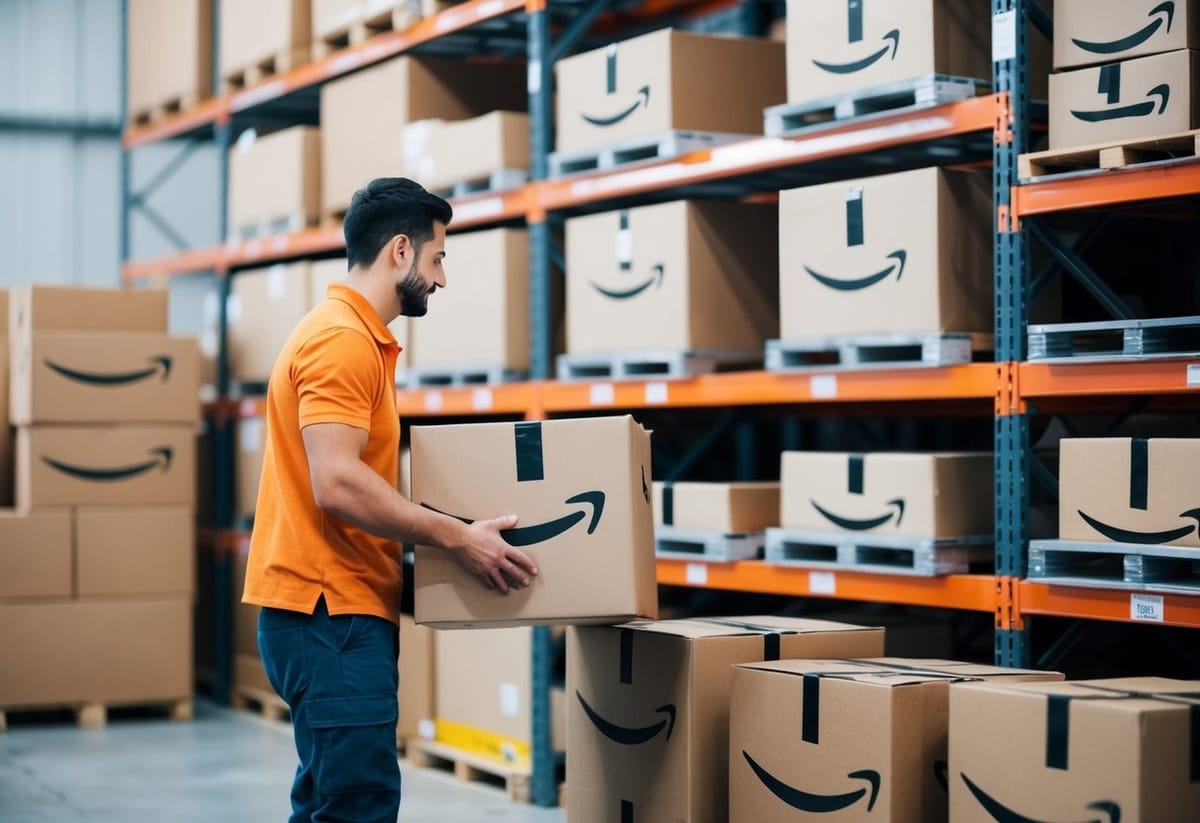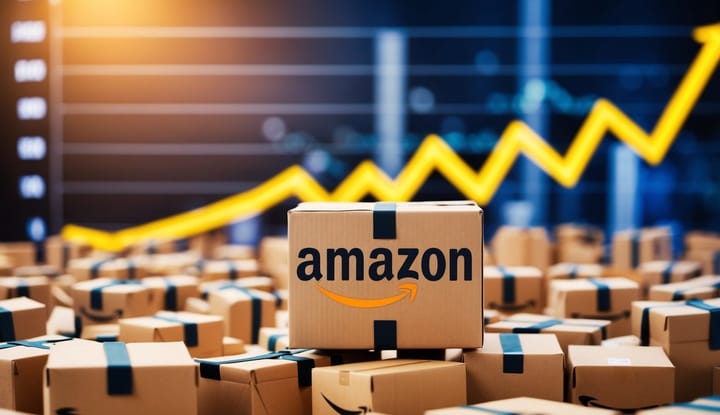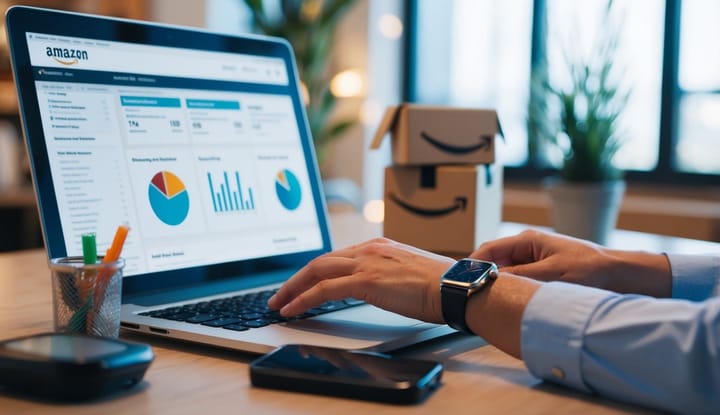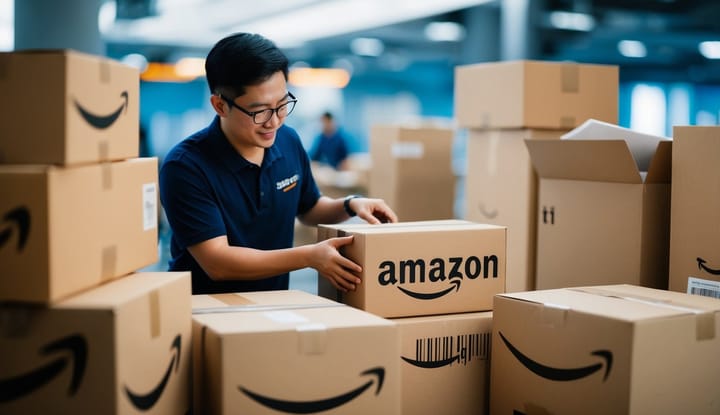Alibaba to Amazon FBA: Streamlining Your E-commerce Supply Chain

Selling products on Amazon has become a popular way for entrepreneurs to start their own businesses. Many sellers turn to Alibaba, a leading e-commerce platform, to find products they can brand and sell. This approach allows them to tap into a vast marketplace of goods at competitive prices.
Alibaba offers a user-friendly interface that makes it easy for sellers of all experience levels to browse and source products. The platform provides access to millions of items that can be customized and private-labeled. This opens up opportunities for sellers to create unique brands and stand out in the crowded Amazon marketplace.
Key Takeaways
- Alibaba is a top choice for sourcing products to sell on Amazon
- The platform offers a wide range of customizable items for private labeling
- Sellers can benefit from competitive pricing and a user-friendly interface
What is Alibaba?

Why are Alibaba's prices so low?
Alibaba offers products at incredibly low prices for several reasons. Most manufacturers on the platform are based in China, where production costs are much lower than in Western countries. This allows them to create quality goods at more affordable rates.
Bulk purchasing also plays a key role in reducing costs. When buyers order large quantities, the price per unit drops significantly. This enables businesses to increase their profit margins by sourcing products in volume.
Which product types work well on Alibaba?
Alibaba excels at providing options for private label products. It's an ideal platform for businesses looking to create unique items with their own branding. Sellers can find suppliers to manufacture products based on custom designs and specifications.
The platform offers a wide range of categories including:
- Electronics
- Fashion accessories
- Home goods
- Beauty products
- Toys and games
It's important to note that Alibaba is not suitable for purchasing branded products from well-known companies. Attempting to resell such items could lead to legal issues and account bans on platforms like Amazon.
Is Alibaba a trustworthy platform?
Alibaba is generally considered a safe platform for business-to-business transactions. However, buyers should exercise caution and follow best practices to avoid potential risks.
Some key safety measures include:
- Vetting suppliers thoroughly
- Looking for verified and gold suppliers
- Checking company profiles and ratings
- Ordering samples before large purchases
- Using Alibaba's secure payment methods
The platform offers Trade Assurance to protect buyers from poor quality products or shipping delays. This service can help resolve disputes and offer refunds when necessary.
What payment options does Alibaba offer?
Alibaba provides several secure payment methods to accommodate global transactions:
- Credit/debit cards (Visa, Mastercard, American Express)
- PayPal
- Apple Pay
- Google Pay
- Afterpay/Clearpay
- Bank transfers with escrow protection
The platform supports over 20 currencies, making it convenient for international buyers. Alibaba's secure payment portal protects users' financial information during transactions.
For large orders, many buyers prefer using Trade Assurance. This system holds payments in escrow until the buyer confirms receipt and satisfaction with the order.
How to find Amazon FBA products on Alibaba
To source products from Alibaba for Amazon FBA, sellers should follow these steps:
- Conduct thorough product research
- Analyze profitability, demand, and competition
- Use the search bar to find potential suppliers
- Contact multiple suppliers for quotes
- Order samples to evaluate quality
- Negotiate terms and place bulk orders
When selecting products, consider the following factors:
- Profit potential: Aim for a 3X markup (1/3 cost, 1/3 fees, 1/3 profit)
- Demand: Ensure there's consistent search volume on Amazon
- Competition: Look for niches with a good balance of demand and competition
Using product research tools can help identify promising opportunities. These tools provide data on sales volume, keyword trends, and competitor performance.
Remember to factor in all costs, including Amazon FBA fees, when calculating potential profits. This will help ensure the products you choose are viable for long-term success on the platform.
How to Sell Products from Alibaba on Amazon
1. Locating Manufacturers on Alibaba
Searching for suppliers on Alibaba is similar to finding products on Amazon. Start by entering keywords related to your desired product. Use filters to narrow down results, focusing on "Trade Assurance" and "Verified Supplier" options for added security.
When browsing listings, pay attention to:
- Product details
- Pricing information (may vary based on specifications and order quantity)
- Supplier profiles
2. Assessing Potential Partners
When evaluating suppliers, consider these factors:
- Company history
- Sales volume
- Employee count
- Quality control processes
- Product range
- Manufacturing capabilities
Review the supplier's Alibaba profile for a comprehensive overview of their business.
3. Reaching Out to Manufacturers
Contact multiple suppliers to compare options. Key considerations include:
- Product quality
- Communication effectiveness
- Industry experience
- Pricing
Tips for contacting suppliers:
- Reach out to 5-10 potential partners
- Provide detailed product specifications
- Be professional and courteous
- Ask about pricing, minimum order quantities, and lead times
- Communicate clearly, considering potential language barriers
- Research each supplier thoroughly
4. Submitting an Order on Alibaba
After selecting a supplier and negotiating terms:
- Send a purchase order agreement outlining units, pricing, and shipping terms
- Review the supplier's invoice
- Pay through Alibaba Trade Assurance for protection
- Consider applying for the Alibaba US Sales Tax Exemption Program if eligible
5. Transporting Goods to Amazon FBA
For small initial orders, suppliers can often arrange shipping to Amazon FBA warehouses. They typically use express carriers like FedEx or DHL and include shipping costs in the invoice.
For larger shipments (over 200 kg or 440 lbs), consider using a freight forwarding company to handle:
- Sea shipments
- Customs clearance
- Packaging requirements
6. Selling Alibaba-Sourced Items on Amazon
To successfully sell Alibaba products on Amazon:
- Conduct thorough product research to identify high-demand, low-competition items
- Calculate potential profit margins, accounting for all costs
- Create compelling product listings with optimized keywords
- Implement effective pricing strategies
- Monitor inventory levels and reorder as needed
- Continuously evaluate product performance and market trends
By following these steps, sellers can leverage Alibaba's vast supplier network to source products and build a successful Amazon business. Remember to prioritize product quality, maintain clear communication with suppliers, and stay informed about Amazon's policies and requirements for FBA sellers.
Build Your Brand with Alibaba's Resources
Alibaba offers entrepreneurs a gateway to create their own private label products. This platform can help turn business dreams into reality. Many sellers use Alibaba to find suppliers for their branded items.
To start, research potential products that fit your brand vision. Look for items with good profit margins and market demand. Once you've chosen a product, use Alibaba to connect with manufacturers.
When working with suppliers:
- Request samples to check quality
- Negotiate prices and terms
- Discuss customization options
Creating a strong brand identity is key. Consider these elements:
- Logo design
- Packaging
- Product features
It's important to track your progress. Use spreadsheets to manage:
- Costs
- Inventory
- Sales data
Building a private label business takes time and effort. Stay focused on your goals and be ready to adapt. With persistence, you can develop successful branded products using Alibaba's vast network of suppliers.
Common Questions About Alibaba and Amazon FBA
Getting Started with Alibaba Sourcing for Amazon FBA
To begin selling Alibaba products on Amazon FBA:
- Research profitable products
- Find suppliers on Alibaba
- Request samples and negotiate prices
- Place an order and arrange shipping
- Create Amazon listings
- Send inventory to Amazon's warehouses
Profitability of Alibaba Products on Amazon
Selling products from Alibaba on Amazon FBA can be profitable. Success depends on:
- Choosing the right products
- Negotiating good prices
- Managing shipping costs
- Setting competitive prices on Amazon
Sellers need to account for all expenses and fees to ensure a healthy profit margin.
Typical Shipping Costs from Alibaba to Amazon FBA
Shipping costs vary based on:
- Product size and weight
- Shipping method (air, sea, express)
- Order quantity
- Destination
Sea freight is often cheaper for large orders. Air shipping costs more but is faster. Express shipping works well for small orders or samples.
Sending Items from Alibaba Straight to Amazon FBA
To ship directly from Alibaba to Amazon FBA:
- Get your supplier's agreement
- Provide Amazon's shipping requirements to the supplier
- Create a shipment plan in Amazon Seller Central
- Send shipping labels to your supplier
- Have the supplier prepare and ship the items
This method can save time and reduce handling costs.
Amazon FBA Eligibility for Alibaba Products
Most Alibaba products can be sold through Amazon FBA if they meet Amazon's rules. Key points:
- Products must be new
- Items need proper labeling and packaging
- Certain categories may need approval
- Products must follow safety and compliance standards
Check Amazon's seller guidelines for specific product requirements.
Calculating China to Amazon FBA Shipping Expenses
Shipping costs from China to Amazon FBA include:
- Freight charges (based on weight or volume)
- Customs duties and taxes
- Handling and documentation fees
- Amazon inbound shipping fees
Use freight calculators or get quotes from shipping companies to estimate costs. Factor in all fees when pricing products to maintain profitability.
Take the first step towards building your Amazon eCommerce business.
Join Mini Course


